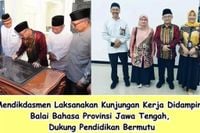Dwi Laily Sukmawati, the Head of BBPJT, recently announced a series of initiatives aimed at enhancing Indonesia's education system, underscoring their alignment with the Kemendikdasmen's vision for educational quality improvement. Among these programs, she highlighted the Festival Tunas Bahasa Ibu (FTBI) and the Adaptive Indonesian Language Proficiency Test (UKBI), both designed for students.
The Festival Tunas Bahasa Ibu (FTBI) serves as a platform for nurturing and promoting regional languages and literature among younger generations, specifically targeting elementary (SD) and junior high school (SMP) students. The festival encompasses various competitive branches including storytelling, speeches, folk tale writing, poetry reading, and debates, all conducted in regional languages, and even includes a comedic element to engage participants.
Simultaneously, the UKBI is recognized as a standardized test used to evaluate a person's proficiency in the Indonesian language, which assesses not only listening, reading, and writing skills, but also speaking abilities and understanding of vocabulary rules.
During her announcement, Dwi Laily expressed the hope that strong collaboration between Kemendikdasmen and the technical implementation units (UPT) would persist, fostering a united effort towards advancing education in Indonesia. She emphasized the importance of these initiatives in instilling a sense of cultural pride among students while simultaneously improving their language skills.
As these efforts roll out, many educators and parents are eyeing the potential impacts on student engagement and the preservation of local cultures through language. The integration of regional themes in educational activities has been a crucial step for education authorities looking to connect students with their heritage, enhancing learning experiences by making education more relevant.
In this context, instructors are encouraged to facilitate involvement in these activities, which not only aim to enrich students' command of the Indonesian language but also serve to engage them in their local cultures meaningfully.
This dual approach not only seeks to fortify language skills but also fosters community ties, nurturing a rich cultural environment that extends beyond the classroom.
The upcoming Festival Tunas Bahasa Ibu is expected to draw participation from a wide array of schools, creating a competitive yet celebratory atmosphere where students can showcase their talents while learning from one another.
With the long-term vision set by the BBPJT, these programs could very well represent a monumental shift in how language is taught and celebrated in Indonesian schools, positioning students as active participants in both their education and their cultural lineage.
This aligns with the broader national goal of raising educational standards, fostering an environment where linguistic proficiency enhances personal identity and national pride.
As discussions around educational reform continue, the focus remains on how to harness these strategies effectively while ensuring accessibility and engagement for all students, regardless of their backgrounds.
Ultimately, the goal is to ensure that students are not only academically proficient but also culturally aware and connected to their roots. Proposed strategies aim to solidify this integration with tangible programs that echo the diversity of Indonesia's rich linguistic tapestry.
This multilateral initiative is indeed a promising step forward in the quest for educational excellence. With the right support and enthusiasm from students, educators, and parents alike, the future of language learning in Indonesia looks brighter than ever.





